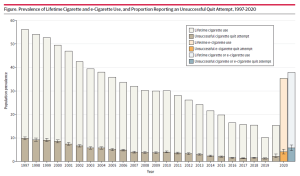Ever since e-cigarettes hit the market in the late 2000s, Texas teens have been hooked. The youth vaping epidemic has challenged school districts nationwide to implement measures to prevent student usage and device solicitation on campus. But with the recent influx of thousands of unauthorized disposable vapes, it has become increasingly difficult to regulate teen use. The Texas legislature responded to the nationwide surge in underage vaping with the passage of House Bill 114, constituting stricter consequences for students who use, possess, or deliver an e-cigarette.
The bill states that students possessing nicotine and THC vapes on school property or at a school-related or school-sanctioned activity may be subject to placement in a disciplinary alternative education program. The overwhelming support for House Bill 114 among representatives is likely a result of the empirical findings suggesting that e-cigarette use has reversed the two-decade-long decline in nicotine addiction and introduced many health concerns for young addicts. However, some students contest the extremity of the new law.

One Paschal alumnus, whose identity we’ve concealed for his privacy, says, “All that happens is people get better at hiding it.” For example, some companies have released vapes disguised as highlighters or inhalers to appeal to teenage users.
“Vaping, in general, is more of a health crisis than a discipline issue in schools,” says the Paschal alumnus. According to a CDC study conducted in 2022, 2.55 million U.S. middle and high school students currently use e-cigarettes, 27.6% of which are daily users. Some teens consume e-cigarette chemicals at a rate equivalent to three packs of cigarettes daily while their brain is not fully developed.
FWISD Board Secretary Anael Luebanos shares the legislature’s concern about the prevalence of vaping among students and says the district will be enforcing stricter policies for students who violate the new law.
“I have been very concerned about vaping at FWISD schools. Too many kids think that starting it is no big deal. But, studies show that it often creates a serious dependence and health problems in young people. We are just discovering the risks, including aerosols in e-cigarettes that contain cancer-causing chemicals like formaldehyde. We will be fully enforcing Texas laws in FWISD Schools on vaping because it’s the right thing for our students.”
The FWISD vaping consequences are as follows:
Possession of E-Cig/Vape pen device only (no THC): Students found in possession of an E-Cig/Vape pen device without THC content will face a one-day intervention at our On Campus Intervention (OCI) program.
Possession of E-Cig/Vape pen (2 or fewer devices) with THC charge (1st offense): For a first offense involving the possession of E-Cig/Vape pen with two or fewer devices and a THC charge, the student will undergo a one-day intervention at either On Campus Intervention or the Metro Opportunity School.
Repeat offenses of possessing E-Cig/Vape pen (2 or fewer devices) with THC charge: In the case of repeated offenses related to the possession of E-Cig/Vape pen with two or fewer devices and a THC charge, the student will be subject to a disciplinary period of 15 days at the Metro Opportunity School.
Possession of E-Cig/Vape pen (3+ devices) with THC charge: Students found with possession of E-Cig/Vape pen containing three or more devices along with a THC charge will face a disciplinary period of 20 days at the Metro Opportunity School.





